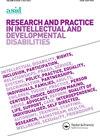Supporting people with cognitive disabilities in contact with the criminal justice system: the importance of relationship-based practice
IF 1.1
Q2 REHABILITATION
Research and Practice in Intellectual and Developmental Disabilities
Pub Date : 2019-07-18
DOI:10.1080/23297018.2019.1629332
引用次数: 8
Abstract
People with cognitive disabilities who encounter the criminal justice system as offenders have often experienced multiple layers of disadvantage. Service responses in the criminal justice system and within the broader community may not adequately address communication, behavioural, and social issues of people with cognitive disabilities, resulting in people continuing to cycle in and out of youth detention or prison and failing to address issues of community safety. This article synthesises the findings from a program of Australian research that explored the experiences and insights of people with cognitive disabilities who have been identified as offenders and service providers who have supported this group in negotiating the system. Taken together, these studies outline a critical role for relationship-based practice with people with cognitive disabilities that address both personal and structural concerns. This practice approach is developmental, focusing on helping a person to achieve power over resources, relationships, information, and decision-making. It is argued that meaningful change can also occur by forming intentional communities around issues of concern. This article identifies how relationship-based practice can occur in interactions with police, within the prison system, and in the context of the National Disability Insurance Scheme (NDIS). These ideas are supplemented by other studies on relationship-based practice to develop a further understanding of how to provide effective support to this group.支持与刑事司法系统接触的认知障碍者:基于关系的实践的重要性
认知障碍者作为罪犯在刑事司法系统中遭遇时,往往会经历多层不利因素。刑事司法系统和更广泛的社区内的服务对策可能无法充分解决认知障碍者的沟通、行为和社会问题,导致人们继续在青少年拘留所或监狱中来回骑行,未能解决社区安全问题。这篇文章综合了澳大利亚一个研究项目的发现,该项目探讨了被认定为罪犯的认知障碍者和支持该群体谈判该系统的服务提供商的经历和见解。总之,这些研究概述了认知障碍患者基于关系的实践在解决个人和结构问题方面的关键作用。这种实践方法是发展性的,侧重于帮助一个人获得对资源、关系、信息和决策的权力。有人认为,通过围绕关注的问题形成有意识的社区,也可以发生有意义的变革。本文确定了基于关系的实践如何在与警察的互动中、在监狱系统中以及在国家残疾保险计划(NDIS)的背景下发生。这些想法得到了其他基于关系的实践研究的补充,以进一步了解如何为这一群体提供有效的支持。
本文章由计算机程序翻译,如有差异,请以英文原文为准。
求助全文
约1分钟内获得全文
求助全文
来源期刊
CiteScore
2.60
自引率
21.40%
发文量
25

 求助内容:
求助内容: 应助结果提醒方式:
应助结果提醒方式:


